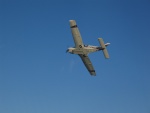N9472C in the air (click to enlarge) |
Every time you fly, you hear it: "You may not use your cell phone and other portable electronic devices in flight because they may interfere with the navigational equipment on this aircraft." Like me, you've probably wondered "is that really true?" An article in IEEE Spectrum by researchers at the Naval Air Warfare Center and Carnegie Mellon University delivers some surprising results.
Bill Strauss, M. Granger Morgan, Jay Apt, and Daniel D. Stancil measured the RF spectrum inside commercial aircraft cabins during 37 real flights over the course of three months in late 2003. They found that a cell phone was illegally used on average at least once per flight. In addition, at least one passenger neglects to turn off their cell phone on any given flight. They also found that cell phones and even laptops with Wi-Fi cards can interrupt the normal operation of key cockpit instruments--especially Global Positioning System (GPS) receivers. This is more than just a "navigation" issue. GPS instruments are used in instrument takeoff and landings.
The radio frequency data was collected, with the permission of the airlines and the FAA using gear concealed in a standard carry-on bag stowed in the overhead luggage bin.
Do these emissions cause problems? NASA studies have shown they do. The authors conducted statistical studies of aircraft safety databases to find incidents where interference from portable electronic devices (PED) might have been a factor.
All in all, we found 125 entries in the ASRS database that reported PED interference. Of these, 77 were considered highly correlated, based on the description of observed PED use and interference occurrence. The reports included cases of critical aircraft systems such as navigation and throttle settings being affected. Based on the random sample entries from 1995 to 2001, we estimate that the average number of reported interference events might be as high as 23 per year. There is considerable uncertainty about how many incidents actually occur in a year; a number of factors could make the number higher--or even lower--than the estimate of 23. Some reported incidents have not been entered into the database, and some of the reported incidents may not be interference events (that is, they might be false positives). But the data certainly suggest that PED interference events occur a few times each month.
In one telling incident, a flight crew stated that a 30-degree navigation error was immediately corrected after a passenger turned off a DVD player and that the error reoccurred when the curious crew asked the passenger to switch the player on again. Game electronics and laptops were the culprits in other reports in which the crew verified in the same way that a particular PED caused erratic navigation indications.From IEEE Spectrum: Unsafe At Any Airspeed?
Referenced Fri Mar 24 2006 15:24:12 GMT-0700 (MST)
If it's really a problem, what's to be done? Even the authors of the article admit that asking people to not use PEDs during flight isn't a reasonable alternative. They suggest steps like giving flight crews real-time monitoring capability so they know when there's problem, harmonizing emissions standards between the FAA and FCC, and continued study. In the meantime, turn off your cell phone.





